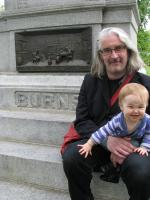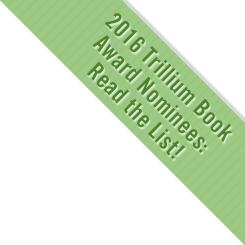by rob mclennan
Originally from Grand Bank, Newfoundland, Ottawa writer Rhonda Douglas has published her poetry and fiction in literary journals across Canada and in New Zealand, and has been a board member of Arc Poetry Magazine. Her poetry and fiction has earned prizes in the Newfoundland and Labrador Arts and Letters Competition, Memorial University’s Gregory J. Power Poetry Contest, The Malahat Review’s Far Horizons Award for Poetry and Arc Poetry Magazine’s Diana Brebner Prize, as well as First Prize for short fiction from Prairie Fire and Room magazines. As part of her 2011 Fiction Contest win from Room magazine, the journal offers:
“... Rhonda Douglas is markedly aware of the narrative challenge she’s undertaken,” Amber Dawn says about “God Explains the Collapse of the Cod Fishery.” “The quirky tension between God’s macro (biological oceanography) and micro (the plight of [protagonist] Wilfred Green) dilemmas make [this] a surprising and utterly enjoyable read.”
Douglas is the author of the poetry collection Some Days I Think I Know Things: The Cassandra Poems (Signature Editions, 2008) and the poetry chapbook How to Love a Lonely Man (Apt. 9 Press, 2013). She is a graduate of the Humber School for Writers and the University of British Columbia Optional-Residency MFA Program in Creative Writing.
This month sees the publication of her first work of fiction, the short story collection Welcome to the Circus from Freehand Books. As part of her “12 or 20 questions” interview posted October 5, 2010, she briefly spoke on her process: “Fiction begins with a fascinating character for me, someone I just can’t resist. That person is facing some serious dilemma or just caught in a ridiculously human moment and then things take off from there. Only when I started working on my novel did I begin to think ‘book-book’ from the start, otherwise I prefer to deal with one dilemma at a time.”
Her bio claims that you “can find her online at www.shallicompare.com and on Twitter: @shallicompare . She splits her time between Ottawa and the Maple Leaf Lounge,” but she has spent the past seven months very far from home: working, travelling and writing through Africa and South America as Global Projects Director for Women in Informal Employment: Globalizing and Organizing (WIEGO). She returns to Ottawa just in time to read from her new collection of short stories at the Ottawa International Writers Festival on April 28th, with a separate launch for the book in Ottawa on May 9th. Publisher’s Weekly, in a recent review, has already declared Welcome to the Circus “an exhilarating read,” writing:
This debut short story collection from Douglas (Some Days I Think I Know Things: The Cassandra Poems) contains 10 stories, all of which bubble with originality and daring. Douglas captures the voices of her characters perfectly within the different forms her stories take. […] Even in stories that take more traditional forms, Douglas’s skill and insight are evident as she explores recurring themes of love and escape: three teenagers from Cupids, Newfoundland, are infatuated with their French teacher and the cosmopolitan life he represents; an anthropologist is more than captivated by an unfrozen Neanderthal discovered in Drumheller; a teenage boy, obsessed with the idea of love, cuts the words of John Donne into his flesh.
Otherwise, she is slowly putting the finishing touches on a second manuscript of poetry, tentatively titled “For.”
rob mclennan:
You’ve been working on fiction for some time, even mentioning in your “12 or 20 questions” interview the fact that you were composing short stories when you were ten years old. How long did it take to compose and compile the ten stories that make up Welcome to the Circus?
Rhonda Douglas:
I started working seriously on fiction about fifteen years ago, but most of the stories from those earlier days didn’t make it to publication. (Thank God!) I remember expressing frustration back then to my writing group and Gabriella Goliger asked me how many stories I had written to that point — the answer was about six. She politely suggested that maybe I should just focus on writing some more, which I did: about a decade’s worth.
The stories in this book were written over about a four year period, with another year or two for editing. I worked on them through the course of the Masters programme in Creative Writing at UBC, working with Zsuzsi Gartner to develop them into my thesis, which then became the book.
rm:
You’ve long written and published both poetry and fiction. Have you found any difficulty working in more than one genre? Are there any connections between your poetry and fiction, or are they entirely separate?
RD:
There are definitely connections. In Welcome to the Circus, one of the stories centres around a young man who carves a John Donne poem into his body, and the poem is also integral to the form of the story.
I think that the explorations in form in this short story collection come in part from my experience with poetry, where I am always concerned about how the work looks on the page and how form intersects with the words to reinforce or enhance meaning.
I don’t find it difficult to switch genres but I don’t tend to work on both in the same writing time, i.e. the same day. Because I work full-time in an absorbing job, I sometimes struggle to find writing time and so when I do make the time, I like to give each project its own mental space. When Welcome to the Circus was edited and with the publisher for printing at the end of last year, I was able to return to my poetry manuscript to revise it.
rm:
You’re close to completing a second poetry manuscript. How do you feel your writing has progressed between the poems that make up “For” and your first published collection, Some Days I Think I Know Things: The Cassandra Poems? What do you see your poems being able to do now that they couldn’t before?
RD:
I’ve been so close to finishing that manuscript for so long now. Every time I think it’s finished, something else occurs to me. However it is finally near completion now — really for real this time! What I am working on now is a new title, since the book has been re-visioned and re-arranged so that “For” no longer works. (If it ever did? Ah: no.)
The important difference with the new poetry manuscript is that I am not working in narrative, so I don’t have to worry about story evolution over the course of a full manuscript in the same way. It’s mostly poem by poem now.
I am more aware than ever of searching for the music in my lines. I’ve also become much more wary of over-intellectualizing in a way that prevents the reader from having an emotional response to the poem. There’s substantially less distance in my work, I think. Michael Dennis described some of the new work as “taut,” with “precision” and “playful ease” — I’d like to think that’s true.
rm:
You’ve spent the past seven months away from home, predominantly in Africa and South America. What has the experience taught you, if anything? Were you able to get any writing done while travelling, and were there any noticeable shifts from the kinds of writing you would have done at home?
RD:
Mostly I’ve learned how badly I need sunshine! I’ve consciously been a winter refugee this year, which is a luxury I have through my work in international development.
I’ve spent the last year revising and editing both the short fiction and poetry manuscripts, with very little “new” creation.
People often ask me why I don’t write about my work. I have written about it some, but I have some ethics concerns about telling stories that really belong to others, particularly the people I work with who are already being exploited in so many ways every day. If I do decide to write about it, then I need to be sure I can do it justice on multiple levels. I’m not ready yet, and not willing to push past those concerns because there’s a potentially marketable book idea. It will take the time it takes.
I’ve been focused on learning Spanish lately and with that has come a kind of immersion in Latin American poets. A friend introduced me to Mexican poet Jaime Sabines (Biblioasis has a lovely translation of his Love Poems), and this was immensely helpful to me at a time when I had doubts about my own work.
I am currently obsessed with the Uruguayan poet Mario Benedetti — some of his early work reminds me of Monty Reid’s in the way that the space on the page is such an integral part of the work. Recently I’ve tried my hand at translation, which I swore I wouldn’t do, but found I just couldn’t resist the lure of getting into the poems at a more cellular level.
I have new ideas swirling about a possible poetry project now, and notes on another novel I’d like to try. All very tentative at this stage, so we’ll see where it goes…veremos!

Born in Ottawa, Canada’s glorious capital city, rob mclennan currently lives in Ottawa with his brilliantly talented wife, the poet, editor and bookbinder Christine McNair, and their daughter, Rose. The author of nearly thirty trade books of poetry, fiction and non-fiction, he won the John Newlove Poetry Award in 2010, the Council for the Arts in Ottawa Mid-Career Award in 2014, and was longlisted for the CBC Poetry Prize in 2012. His most recent titles include notes and dispatches: essays (Insomniac press, 2014), The Uncertainty Principle: stories, (Chaudiere Books, 2014) and the poetry collection If suppose we are a fragment (BuschekBooks, 2014). An editor and publisher, he runs above/ground press, Chaudiere Books (with Christine McNair), seventeen seconds: a journal of poetry and poetics (ottawater.com/seventeenseconds), Touch the Donkey (touchthedonkey.blogspot.com) and the Ottawa poetry pdf annual ottawater (ottawater.com). He also curates the weekly “Tuesday poem” series at the dusie blog, and the “On Writing” series at the ottawa poetry newsletter. He spent the 2007-8 academic year in Edmonton as writer-in-residence at the University of Alberta, and regularly posts reviews, essays, interviews and other notices at robmclennan.blogspot.com. He currently spends his days full-time with toddler Rose, writing entirely at the whims of her nap-schedule.


Post new comment